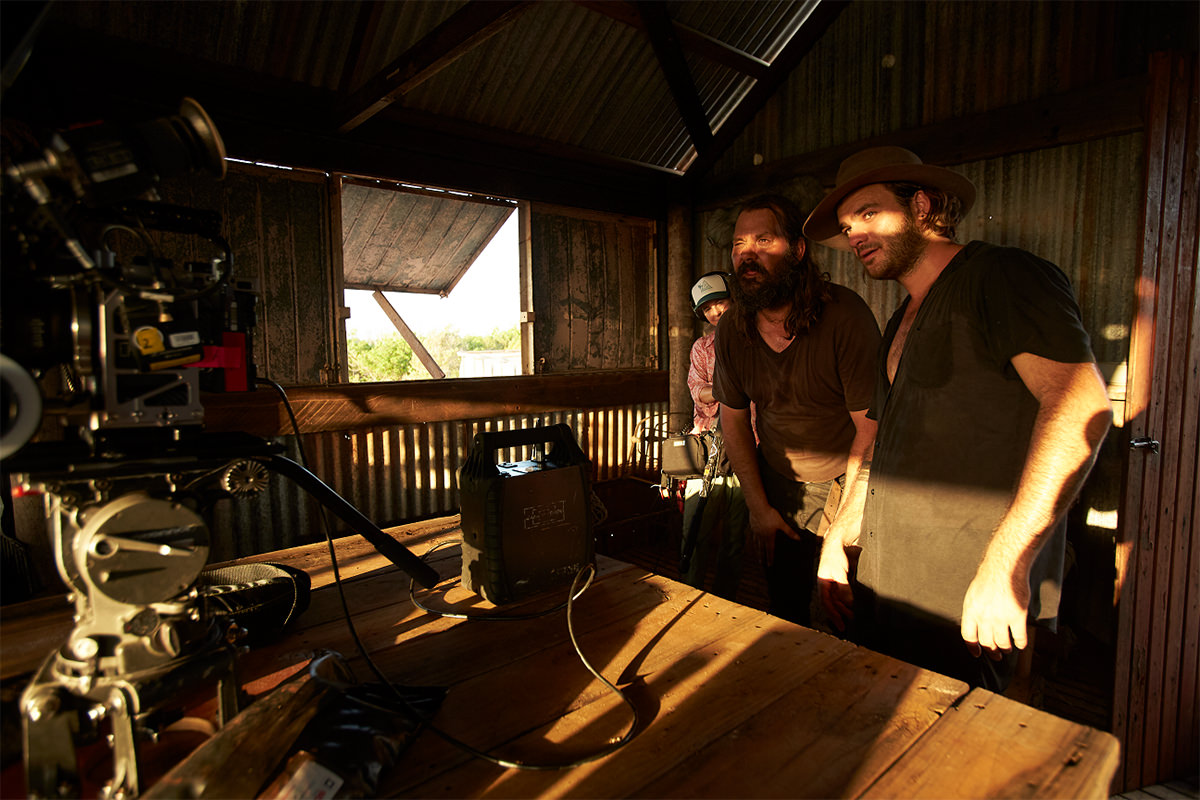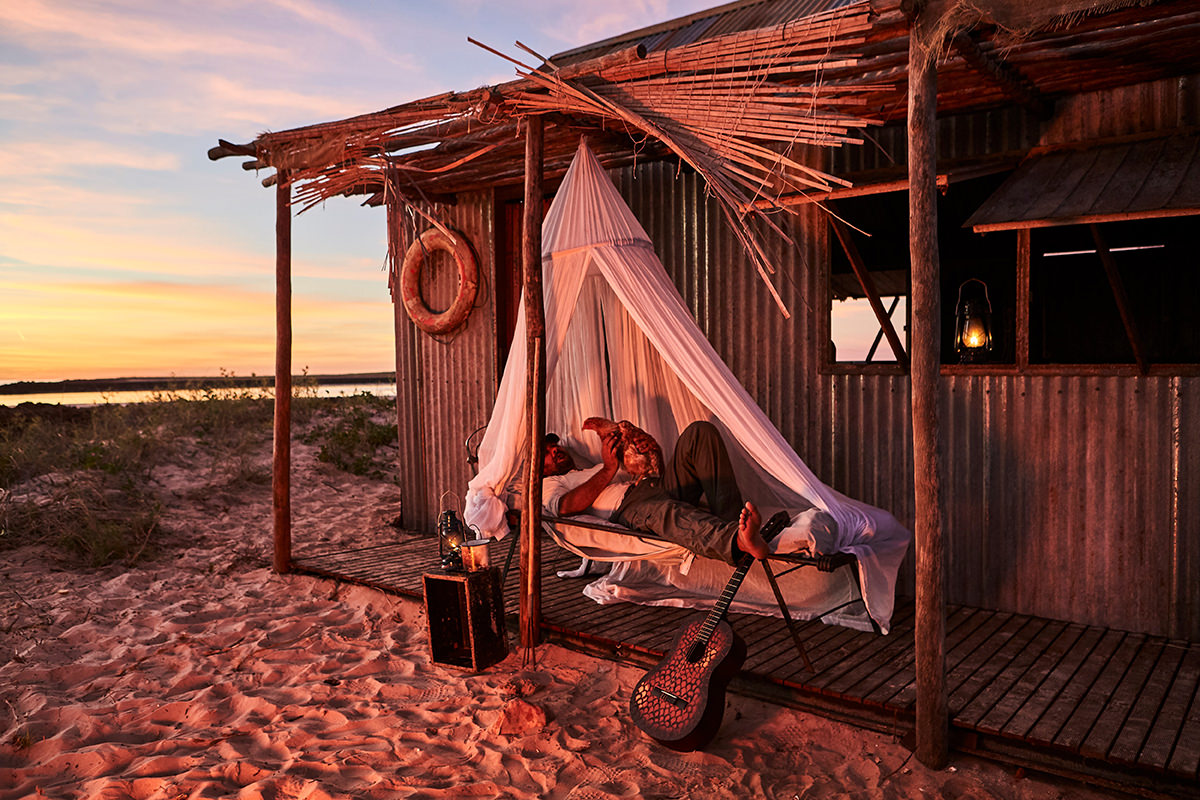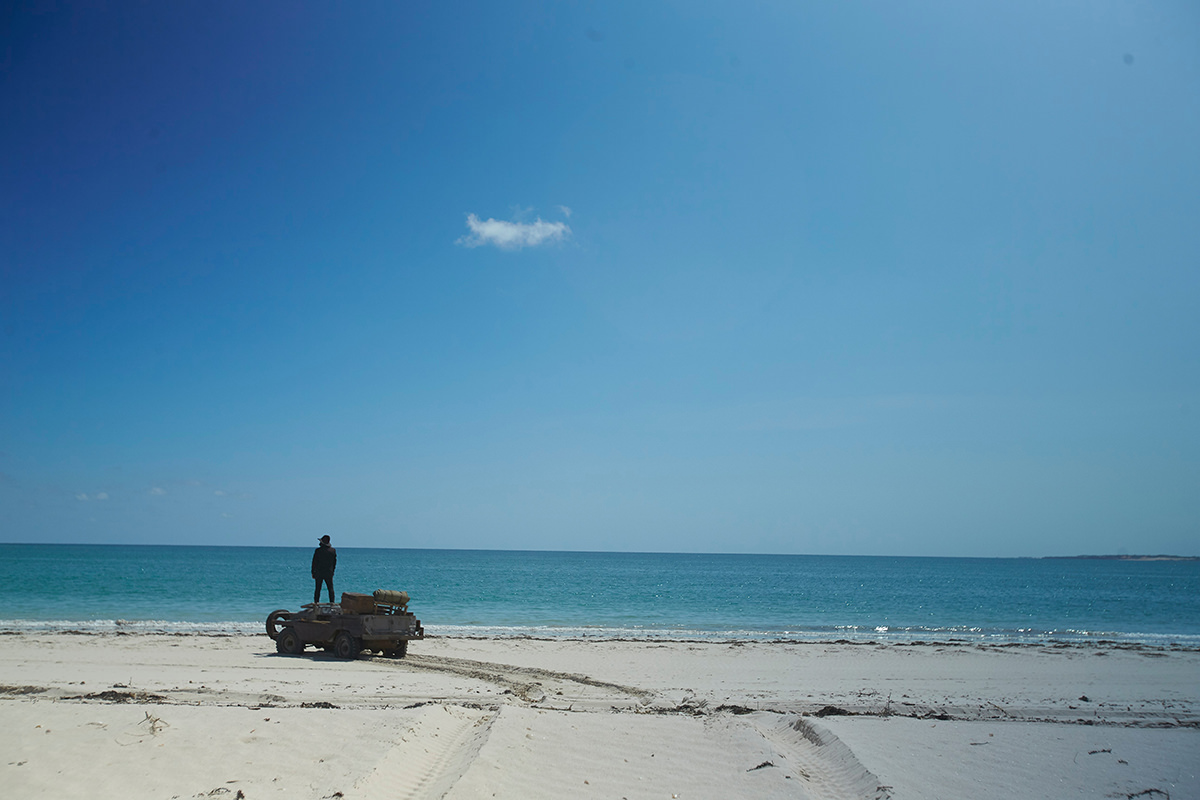Warwick Thornton turns the camera on himself
Acclaimed filmmaker Warwick Thornton on being both director and subject in The Beach, and back-to-back filming in Western Australia on Mystery Road.
 Warwick Thornton and Dylan River on the set of The Beach
Warwick Thornton and Dylan River on the set of The Beach
Filmmaking is like cooking.
That’s according to Warwick Thornton, the acclaimed filmmaker behind Sweet Country and Samson & Delilah, as he considers his advice for any budding fellow director, writer or cinematographer.
“You’re going to burn some things, make some sh*t,” he says over the phone from Sydney. “You’ll find your groove – maybe you’re better at baking than stir-frying. Have fun and don’t take it too seriously. The less seriously, you take it, the more you’ll be able to create and have an amazing journey with it.”
This idea works especially well alongside The Beach – a beautifully-crafted documentary that will screen as both a three-hour event on 29 May, and as six half hour episodes. Filmed over six weeks (with an additional two weeks of pre-production), Thornton is both director and subject, turning the camera on himself during a self-imposed isolation on the north west coast of Western Australia as he tries to transform his life. Holed up in a corrugated iron beach shack, Thornton has no electricity, no alcohol, and no entertainment – bar a guitar and a few chickens – but what he does have is a lot of basic ingredients, some old hunting skills, and a passion for cooking.
“I always wanted to make a cooking show,” Thornton says. “[And] I was a bit burnt out, a bit tired, I’d been drinking too much, and I needed to pull my head in and look at myself sideways. That’s where [I thought], well maybe we can turn this into a journey for more than just me and for an audience as well.”
Thornton put together a three-page outline, Screen Australia and NITV came on board, and from there they had to decide where to shoot. Thornton says the team, including producers Michelle Parker, Tanith Glynn-Maloney and Mitchell Stanley, knew they would need to build the shack.
“To go and look for a beautiful shack kind of would have limited our locations,” he said.
“I was going to go straight onto Mystery Road after it (which he co-directed with Wayne Blair) and [thought] well it’s probably better if I do it in the Kimberley, and find the right place there, so I’m still in the same [area].
“There’s a whole lot of pre for Mystery Road that was happening for me, while doing The Beach, by just being in The Kimberley, and understanding the country and the light and weather.”
Once they found the spot, on the Dampier Peninsula, they spoke with the Traditional Owners about their ideas for The Beach.
“They were all really excited,” he says. The plan was that the production would build the shack and pull it down if the Traditional Owners didn’t like it, “so there won’t even be a footprint on the ground when we leave.” Or leave it standing if they liked it.
Safe to say, the shack is still standing (“they loved it,” Thornton says).
 The Beach
The Beach
During the two weeks of pre-production, Thornton explored the area with the knowledge that over the six weeks of filming, any meals with seafood would have to be hunted or foraged, relying on skills like that of his ancestors, the Kaytetye people of central Australia.
“Looking at finding the right place where I know there’ll be a whole lot of mud crab, or that’s a good place at high tide to spear fish, or there’s a whole cockle pipi patch there. Just getting the food part of it, so I know there will be some recipes and food to eat – it won’t just be steamed rice.”
All in all, the crew for The Beach was made up of just eight people, but Thornton says the main people actually at the shack were cinematographer Dylan River (who’s also Thornton’s son), sound recordist Nicole Lazaroff, and camera assistant William ‘Billy’ Wright.
“But it’s funny, after the first week you forget that they’re there and you just keep pottering around,” he says, although he often would give them a heads up if he was to go outside, “rather than just walking out and they have to run after me.”
Each episode of The Beach, also has Thornton recalling a memory or story – either to the camera, or to the chickens. These, he says, all came out organically, rather than being rehearsed or prompted.
Warwick Thornton in The Beach
“We’ve all got 1,000 stories and if we wrote them properly they’d all be Oscar-award winning films. Every single human has that in them. It’s just embracing and choosing and being empowered. And looking at the dark side of your life, as well as the amazing exciting part of your life.”
What follows is more of Thornton’s takeaways from the filming of The Beach and going straight onto Mystery Road:
SHOOTING IN THE KIMBERLEY
“You’ve got to work with it. In the first week it rained for one day. It was the most beautiful piece of rain, and I decided ‘nah let’s just chill’, and not shoot, cause it’s just expected to rain every week.
It didn’t rain for the next seven weeks [of production]. There’s so many scenes I could’ve done, wonderful scenes in the rain… but it never rained again. So don’t just expect that it will do what it’s always done.
It didn’t rain basically all the way through Mystery Road as well, which was great for the schedule. We didn’t have to stop because of weather, so we ploughed through. I think on Mystery Road we did literally half an hour’s overtime in 10 weeks. The weather was perfect.”
THE DOP-DIRECTOR RELATIONSHIP
“If you’ve asked someone to shoot for you, you have to respect them and you’ve brought them on because you think they’re the right person to do that job.
“If I’ve asked my son to be DP on something, I have to treat him as the DP – as an especially creative human being with a voice and emotions. Just because I’m a DP, I can’t go ‘oh why are you doing this, why are you doing that’. You try and connect rather than disconnect.
“He likes wide lenses. I like long lenses. You know if you’re shooting someone’s face, I suggest you use an 80mm-120mm, but he’s in a different generation who likes those wider lenses like a 26mm-32mm – which give a different perspective. They widen your face, they don’t slender your face. But that’s just my vanity.”
 The Beach
The Beach
THE EDIT
“It was actually a really close shooting ratio. I think it was 3:1, which is quite insane.
“It was about a 12-week edit. But that edit started while I was doing Mystery Road. I wasn’t in that edit suite for a lot of it, it was just Andrea Lang by herself sending me stuff. So I’d be directing Mystery Road and then I’d be watching The Beach at night
“Yeah not advisable (back-to-back filming). You don’t want to put too much pressure on yourself. Especially for something like The Beach, which is important and if you’re tired from a serious, fast 10-hour day of television and then you’ve got to sit down and watch yourself in a 70-minute assembly of something that’s supposed to be 26 minutes long. That’s not advisable.
“The hardest thing about the edit was the vanity. You know ‘don’t use that shot because I look like sh*t’ and then realising that’s the shot you should use because you did look like shit… your vanity takes over if you’re directing and you’re in front of the camera. You’ve just got to relinquish that. You’ve got be strong and honest, and show the truth to the audience.”
THE BEST PART OF THE FILMMAKING PROCESS (PRE, SHOOTING, POST)
“They all have their ups and downs. It’s all painful. You work incredibly hard. You’ve got to be focused, you’ve got to be fearful, you’re got to be dangerous, you’ve got to try things. My favourite part of it is walking the f**king red carpet with a beer.
The happy ending is probably what you strive for.”
DON’T FORGET
“[Filmmaking] is a craft, so don’t be afraid to emulate at the beginning, because it just takes a little bit longer to find your own style. So if you like someone else’s work, just have a look at how they do it and use that to create your foundation, and then from there, when you have all that beautiful knowledge that’s when you can explode and create in your own existence and do incredibly unique things.
The Beach screens in a special three-hour TV event across NITV, SBS and SBS On Demand on Friday May 29 at 7.30 pm. From 1 June, NITV will screen the The Beach in six parts at 7.30pm each night. Mystery Road Season 2 is available to watch on iview.
Parts of the Q&A portion of this interview have been edited and condensed.

What to read next
Director Entertainment and Specialist at the ABC - Michael Carrington - discusses the ABC's priorities, the significance of iview, and opportunities for Australian creatives.
27 May 2020
Caris Bizzaca